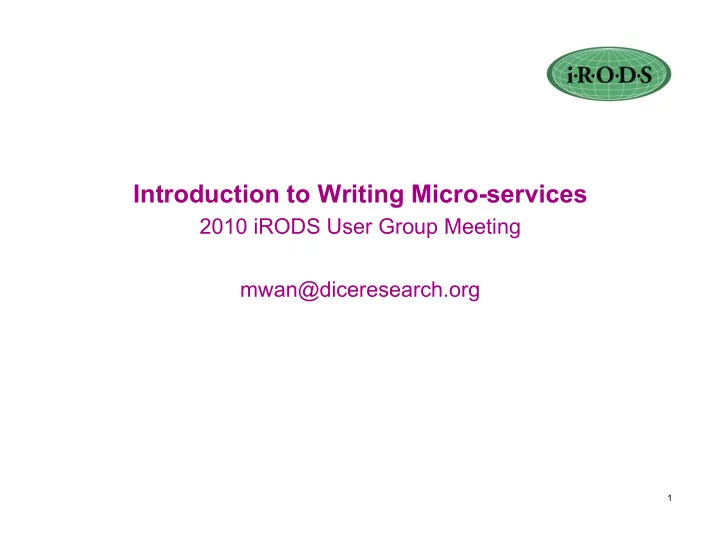

Introduction to Writing Micro-services 2010 iRODS User Group Meeting mwan@diceresearch.org 1
Micro-service Input/output parameters • Prototype of a micro-service int findObjType ( msiParam_t *objInput , msiParam_t *typeOutput , ruleExecInfo_t *rei ); • All micro-services only use msiParam_t for input/output • The last input parameter is always ruleExecInfo_t *rei 2
Micro-service input/output parameter type - msParam_t All MS input/output parameters use the same structure typedef struct MsParam { char *label; /* name of the parameter */ char *type; /* type of the parameter */ void *inOutStruct; /* pointer to value/structure of the parameter */ bytesBuf_t *inpOutBuf; /* optional buffer pointer for binary values */ } msParam_t; • label • Used by the rule engine to identify the parameter • Not a concern for MS programming type • • Identifies the type of data stored in inOutStruct • Self defining data structure inOutStruct • • pointer to a struct that contains the input/output data • inpOutBuf • Pointer to an optional buffer for large data 3
The type field of msParam_t • The “type” field defines the type of data in the struct. • Some commonly used types: • STR_MS_T - string type (most common) • StrArray_MS_T • INT_MS_T – integer type • IntArray_MS_T • DOUBLE_MS_T • DataObjInp_MS_T– input struct for data object operation • CollInp_MS_T • KeyValPair_MS_T – key/value pair • GenQueryInp_MS_T – input struct for general query • GenQueryOut_MS_T • RodsObjStat_MS_T • Defined in msParam.h 4
msParam helper routines • Routines to parse and fill in the msParam_t struct • Can be found in msParam.c • Int fillMsParam (msParam _t *msParam, char *label, char *type, void *inOutStruct, bytesBuf_t *inpOutBuf); • Gen eri c, fields will only be modified if non-null input. Normally, “label” input is null. • Int fillIntInMsParam (msParam_t *msParam, int myInt); • Int fillStrInMsParam (msParam_t *msParam, char *myStr); • Int resetMsParam (msParam_t *msParam); • Free all fields except label. • Int parseMspForPosInt (msParam_t *inpParam); • char *parseMspForStr (msParam_t *inpParam); • Int parseMspForCollInp ( ms P aram_t *inpParam, collInp_t *collInpCache, collInp_t **outCollInp, int writeToCache) 5
msKeyValStr – string input for key/value • A special kind of STR_MS_T • Format – keyWd1=value1++++keyWd2=value2++++keyWd3=value3... • A way to input several inputs with one string • Helper routines – parseMsKeyValStrForDataObjInp and parseMsKeyValStrForCollInp • Example: • validKwFlags = DEST_RESC_NAME_FLAG | CREATE_MODE_FLAG | DATA_TYPE_FLAG |FORCE_FLAG_FLAG | DATA_SIZE_FLAGS | OBJ_PATH_FLAG; • rei->status = parseMsKeyValStrForDataObjInp (msKeyValStr, myDataObjInp, DEST_RESC_NAME_KW, validKwFlags, &outBadKeyWd); 3 rd input (DEST_RESC_NAME_KW) – for backward compatibility. If “=” • not present in msKeyValStr, assume it is a destRescName input 6
Session system parameters • ruleExecInfo_t *rei • A large data structure passed when invoking a rule • Contains system parameters and parameters relevant to the rule invoked: • *rsComm - client-server communication structure • *doi - dataObject information • *rescGrp - resource (group) informations • *uoic - client user information 7
Session system parameters • $ variables – Variables start with “$” • Provides a way for rules to reference values in rei structure • A mapping from a name to values in rei. • These mappings are defined in a configuration file: • objPath rei->doi->objPath • rescName rei->doi->rescName • userNameClient rei->uoic->userName • These variables can be referenced by rules and MSs • Condition: $objPath like /zone/home/sekar@sdsc/nvo/* • Input Parameters of MS: findObjType($objName,*Type) 8
Writing Micro-services • Typically MS codes are short • Call existing server routines • Reasonably familiar with server routines • Server API handler routines • Each client API has one server API handler • I n dataObjOpen.h : rcDataObjOpen() and rsDataObjOpen() • To open an iRods file on the server, call rsDataObjOpen • Prototype of Client API s and Server API handler are given in the lib/api/include directory 9
A micro-service example (msiDataObjRepl in reDataObjOpr.c iint msiDataObjRepl (msParam_t *i npParam1, msParam_t *msKeyValStr, msParam_t *outParam, ruleExecInfo_t *rei) { rsComm_t *rsComm; dataObjInp_t dataObjInp, *myDataObjInp; transStat_t *transStat = NULL; char *outBadKeyWd; int validKwFlags; RE_TEST_MACRO (" Calling msiDataObjRepl") rsComm = rei->rsComm; /* parse inpParam1 */ re i->status = parseMspForDataObjInp (inpParam1, &dataObjInp, &myDataObjInp, 0); if (rei->status < 0) { .... } 10
Micro-service example (cont.) validKwFlags = OBJ_PATH_FLAG | DEST_RESC_NAME_FLAG | NUM_THREADS_FLAG | BACKUP_RESC_NAME_FLAG | RESC_NAME_FLAG | UPDATE_REPL_FLAG | REPL_NUM_FLAG | ALL_FLAG | IRODS_ADMIN_FLAG | VERIFY_CHKSUM_FLAG | RBUDP_TRANSFER_FLAG | RBUDP_SEND_RATE_FLAG | RBUDP_PACK_SIZE_FLAG; rei->status = parseMsKeyValStrForDataObjInp (msKeyValStr, myDataObjInp, DEST_RESC_NAME_KW, validKwFlags, &outBadKeyWd); if (rei->status < 0) { ...} rei->status = rsDataObjRepl (rsComm, myDataObjInp, &transStat); if (rei->status >= 0) { fillIntInMsParam (outParam, rei->status); } else {.....} return (rei->status); } 11
Writing micro-services Adding a MS to the built-in server module • Add a MS routine msiMyRoutine to an existing file reDataObjOpr.c • Add the prototype of msiMyRoutine to reDataObjOpr.h • int msiMyRoutine (msParam_t *collection, msParam_t *targetResc, msParam_t *status, ruleExecInfo_t *rei); • Add a line to the reAction.table file …… {"msiRmColl",3,(funcPtr) msiRmColl}, {"msiReplColl",4,(funcPtr) msiReplColl}, {"msiMyRoutine",3,(funcPtr) msiMyRoutine}, 12
Adding a new Micro-service module • Modules are a set of optional MSs that can be compiled and linked with the server • https://www.irods.org/index.php/How_to_create_a_new_module • The “modules” directory contains the optional MS modules • hdf5, images, ERA • Create a new directory for your module • Easiest just to copy the entire directory of an existing module for the structure • Edit the Makefile to include your MS files • Build the server with your module, do either: • ./configure --enable-myModule • Edit the config/config.mk file by add an entry in the MODULES definition • MODULES= properties hdf5 myModule 13
Recommend
More recommend